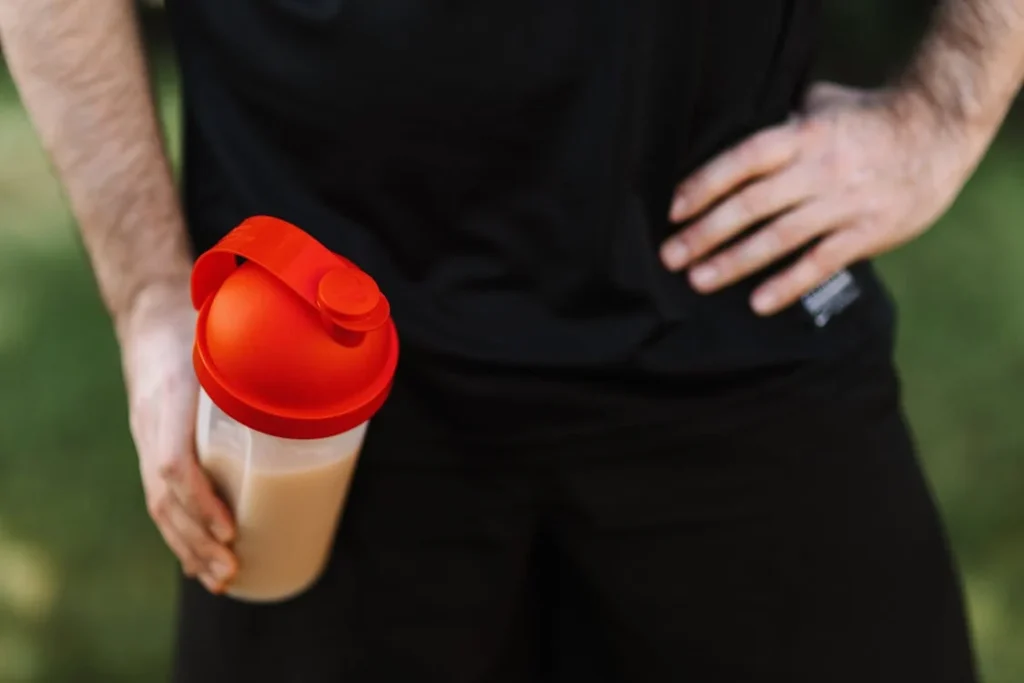Protein is an important part of recovery and overall health, especially after an amputation. Your body needs it to heal wounds, rebuild muscles, and stay strong. Many people turn to protein shakes as a quick and easy way to get enough protein. But are they really necessary for amputees? Do they offer benefits that regular food cannot?
The answer depends on many factors, including your diet, activity level, and overall health. Some people find protein shakes helpful, while others may not need them at all. Understanding how protein affects the body after an amputation can help you make the right choice.

The Role of Protein in Recovery After Amputation
Protein plays a vital role in helping the body heal and stay strong after an amputation. When you lose a limb, your body goes through major changes.
Muscles that were once used differently must now adapt, and your overall strength and mobility depend on how well your body recovers.
Protein is the building block for muscle repair, tissue healing, and immune function, all of which are crucial after surgery.
How Protein Supports Healing
After an amputation, your body immediately starts repairing damaged tissues. This process requires protein to rebuild muscle fibers, strengthen the residual limb, and prevent excessive muscle loss.
Without enough protein, the healing process can slow down, increasing the risk of infections, fatigue, and even difficulty adjusting to a prosthetic.
Muscle loss is a major concern after an amputation. When a limb is removed, the surrounding muscles may weaken due to lack of use.
Over time, without enough protein, this muscle loss can make it harder to move, balance, and even perform daily activities.
For amputees who plan to use a prosthetic, strong muscles are essential for stability and proper function.
Protein also helps regulate metabolism and maintain a healthy weight. After an amputation, your energy needs may change.
Some people experience weight gain due to decreased activity, while others may lose weight too quickly due to stress or changes in eating habits.
Protein helps keep metabolism steady, preventing unwanted muscle loss while supporting a balanced weight.
Can You Get Enough Protein From Food?
Many people wonder if they need protein shakes or if regular food is enough. The truth is, whole foods provide all the protein the body needs if consumed in the right amounts.
Foods like eggs, chicken, fish, dairy, beans, lentils, and nuts are rich sources of protein and come with additional nutrients that help with digestion and overall health.
One advantage of whole foods over protein shakes is that they provide fiber, healthy fats, and vitamins that support long-term health.
A balanced diet with enough protein from natural sources is usually the best option. However, in some cases, getting enough protein from food alone can be challenging, especially if appetite is low or dietary restrictions make it difficult to eat enough high-protein foods.
When Might an Amputee Need Protein Shakes?
While whole foods are generally the best way to get protein, there are certain situations where protein shakes can be helpful.
After surgery, some amputees struggle with a reduced appetite or nausea, making it hard to eat full meals. In these cases, a protein shake can provide essential nutrients in a way that’s easier to consume.
For amputees who are physically active, going through rehabilitation, or using a prosthetic, the body may need extra protein to support muscle strength and endurance.
Physical therapy and exercise place more demands on the muscles, requiring a higher intake of protein to prevent fatigue and weakness.
Another reason someone might consider protein shakes is convenience. Not everyone has the time or ability to prepare balanced, high-protein meals throughout the day.
A protein shake can be a quick and easy way to meet daily protein needs without much effort.
Are Protein Shakes Better Than Whole Foods?
Protein shakes are often advertised as a fast and effective way to get enough protein, but are they really better than whole foods? The answer depends on your individual needs. While protein shakes can be useful in certain situations, they should not replace real food entirely.
Whole foods provide a balanced mix of nutrients that help with digestion, energy levels, and overall health, while protein shakes are often processed and may lack important vitamins and minerals.
The Benefits of Whole Foods
Whole foods contain more than just protein. They also provide fiber, healthy fats, vitamins, and minerals that work together to support the body. For example, eggs not only provide high-quality protein but also essential nutrients like vitamin B12 and choline, which support brain function.
Fish offers protein along with omega-3 fatty acids that help reduce inflammation. Beans and lentils contain fiber, which helps with digestion and keeps blood sugar levels stable.
Another benefit of whole foods is that they take longer to digest. This keeps you feeling full for longer and helps with better absorption of nutrients.
Protein shakes, on the other hand, are quickly absorbed, which can cause a short burst of energy but may not keep you satisfied for long.
Eating whole foods also helps with portion control and prevents overeating, which can be a concern for those managing weight after an amputation.
The Pros and Cons of Protein Shakes
Protein shakes can be a convenient option for amputees who struggle to eat enough protein-rich foods. If appetite is low, chewing is difficult, or there is limited access to healthy meals, a protein shake can be a quick way to meet nutritional needs.
They are also useful for people who are active in physical therapy, where the demand for protein is higher to support muscle growth and recovery.
However, not all protein shakes are created equal. Many contain added sugars, artificial flavors, and preservatives that may not be ideal for long-term health.
Some shakes also have a high protein content that exceeds what the body actually needs, which can put strain on the kidneys over time. It is important to choose a high-quality protein shake with minimal additives and natural ingredients if you decide to include them in your diet.
Finding the Right Balance
For most amputees, the best approach is to rely on whole foods as the primary source of protein while using protein shakes only when necessary.
A well-balanced diet that includes lean meats, dairy, nuts, and plant-based proteins will provide a steady supply of nutrients that support overall health. If a protein shake is needed, it should be chosen carefully and used as a supplement, not a replacement for meals.

How to Choose the Right Protein Shake
If you decide to include protein shakes in your diet, choosing the right one is important. Not all protein shakes are the same—some are packed with high-quality ingredients, while others contain artificial additives and excessive sugar.
Knowing what to look for can help you make the best choice for your recovery and overall health.
Understanding Protein Sources
Protein shakes are made from different types of protein, each with its own benefits. Whey protein, which comes from dairy, is one of the most common and is known for its fast absorption.
It contains all the essential amino acids needed for muscle repair and is a good option for those going through physical therapy or an active rehabilitation process.
Casein protein, also from dairy, digests more slowly and provides a steady release of amino acids, making it useful for maintaining muscle strength throughout the day.
For those who are lactose intolerant or prefer plant-based options, soy, pea, and rice protein are good alternatives. Pea protein, in particular, is rich in branched-chain amino acids (BCAAs), which help prevent muscle breakdown.
Soy protein is another complete protein source, meaning it provides all essential amino acids that the body cannot produce on its own.
Avoiding Unnecessary Additives
Many commercial protein shakes contain added sugars, artificial flavors, and preservatives that are not beneficial for health. Some brands include sweeteners like high-fructose corn syrup or artificial sugar substitutes, which can cause blood sugar spikes and energy crashes.
Checking the ingredient list and choosing a shake with minimal additives ensures that you are getting a clean and nutritious product.
It’s also important to check for unnecessary fillers. Some shakes contain thickeners and emulsifiers that improve texture but offer no nutritional value.
The simpler the ingredient list, the better. If possible, opt for protein powders that contain only the protein source and a few natural ingredients, allowing you to mix them with milk, water, or smoothies for a healthier alternative.
Balancing Protein Intake with Other Nutrients
Protein shakes should not replace whole meals but should be used as a supplement when needed. A well-rounded shake includes not only protein but also healthy fats and some carbohydrates to provide lasting energy.
Mixing a protein shake with milk, adding a banana or a handful of nuts, can make it a more complete and balanced option.
Staying mindful of overall protein intake is also important. Too much protein, especially from processed sources, can put extra strain on the kidneys.
Amputees should aim for a balanced diet that includes protein from both shakes and whole foods to ensure they are getting all the essential nutrients for recovery and long-term health.

How Much Protein Do Amputees Actually Need?
Protein is essential for healing and muscle maintenance, but how much is actually needed? The answer depends on several factors, including age, activity level, and overall health.
For amputees, the right amount of protein helps with wound healing, prevents muscle loss, and supports mobility, especially for those using a prosthetic. However, consuming too much protein is not beneficial and can put unnecessary strain on the kidneys.
Factors That Determine Protein Needs
After an amputation, the body’s demand for protein increases due to the healing process. Surgery creates wounds that need to be repaired, and the muscles surrounding the residual limb require strength to compensate for the lost limb.
For those in the early stages of recovery, higher protein intake can help with faster tissue repair and immune function.
Physical activity also plays a role. Amputees going through rehabilitation or engaging in regular exercise need more protein than those who are less active.
Strength training, walking with a prosthetic, and daily movements require muscle support, which protein provides. Those who are physically active may require slightly higher protein intake to maintain energy and prevent fatigue.
Age and overall health affect how the body processes protein. Older adults may require more protein to prevent muscle loss, while individuals with kidney conditions should be careful not to overconsume protein, as it can lead to complications.
Anyone with pre-existing health conditions should consult a doctor or nutritionist to determine the right amount of protein for their specific needs.
How to Calculate Protein Intake
A general guideline for protein intake is 1.2 to 2.0 grams per kilogram of body weight for individuals recovering from an amputation. This range supports healing, muscle maintenance, and overall energy needs.
For example, if a person weighs 70 kg (154 lbs), they may need between 84 and 140 grams of protein per day, depending on their activity level.
For those who are moderately active, protein intake should be closer to the lower end of the range. If engaging in regular physical therapy or strength training, aiming for the higher end may be beneficial.
The key is to balance protein intake with other nutrients, ensuring that the body gets a mix of healthy fats, carbohydrates, and vitamins for complete recovery.
Protein shakes can help reach protein goals on days when whole foods are not enough, but they should not be the primary source of nutrition.
A balanced diet that includes protein-rich foods like eggs, lean meats, dairy, beans, and nuts will provide a steady and natural supply of protein without the need for excessive supplementation.
Signs You’re Getting Too Little or Too Much Protein
If protein intake is too low, signs may include slow wound healing, muscle weakness, frequent fatigue, and increased hunger. This can make rehabilitation more difficult and delay progress in physical therapy.
On the other hand, consuming too much protein can lead to dehydration, digestive discomfort, and kidney strain over time.
Listening to the body and adjusting protein intake based on recovery progress is important. A well-balanced diet, combined with the right amount of protein, ensures that the body remains strong and prepared for the challenges of life after an amputation.

The Best Times to Consume Protein for Maximum Benefit
Eating the right amount of protein is important, but when you consume it also plays a role in recovery and muscle maintenance.
Amputees need to ensure their bodies are getting a steady supply of protein throughout the day to support healing, maintain energy, and prevent muscle loss. Timing protein intake correctly can help maximize its benefits and improve overall strength and mobility.
Why Protein Timing Matters
The body does not store protein the same way it stores carbohydrates and fats. Instead, it uses what it needs at the moment and eliminates the rest.
This means that eating a large amount of protein in one sitting is not as effective as spreading intake throughout the day. By consuming protein at regular intervals, the body gets a steady supply of amino acids, which are needed for muscle repair and immune function.
For amputees going through physical therapy or adjusting to a prosthetic, protein timing becomes even more important. The muscles that support movement need constant nourishment to stay strong and avoid fatigue.
Consuming protein at key moments—such as before or after rehabilitation exercises—helps with muscle recovery and prevents soreness.
The Best Times to Consume Protein
Starting the day with protein is a great way to maintain energy levels and prevent muscle breakdown. After a long night without food, the body needs nutrients to repair and fuel itself.
A breakfast rich in protein, such as eggs, yogurt, or a smoothie with protein powder, can help jumpstart metabolism and provide sustained energy.
Before physical activity, having a small protein-rich snack can help prepare the muscles for movement. This is especially important for those who use a prosthetic, as the body relies on core strength and stability to move efficiently.
Foods like nuts, a boiled egg, or Greek yogurt can provide a light protein boost without feeling too heavy.
After exercise or therapy, protein intake is crucial for muscle recovery. The body is in a repair phase after activity, and consuming protein within 30 to 60 minutes of finishing a workout helps rebuild muscles and reduce soreness.
A protein shake can be a quick option, but whole foods like chicken, tofu, or cottage cheese are also effective in restoring strength.
Before bedtime, having a small amount of protein can prevent overnight muscle breakdown. Casein protein, found in dairy products like milk and cheese, digests slowly and provides the body with a steady release of amino acids while sleeping.
A light snack such as a glass of milk or a handful of nuts can help maintain muscle health overnight.
Balancing Protein with Other Nutrients
While protein is essential, it should not be consumed alone. Pairing protein with healthy fats and complex carbohydrates ensures the body gets a well-rounded source of energy.
For example, eating protein with whole grains, vegetables, and nuts can help improve digestion and provide lasting benefits.
Hydration also plays a role in protein absorption. Drinking enough water throughout the day helps the body process protein more efficiently and prevents dehydration, which can lead to fatigue and muscle cramps.
By focusing on both the amount and timing of protein intake, amputees can optimize their recovery, maintain muscle strength, and improve overall mobility. Proper nutrition, combined with physical therapy and rest, ensures a smoother transition to an active and independent life.

Common Myths About Protein Shakes for Amputees
There is a lot of conflicting information about protein shakes and their role in recovery. Some believe they are essential for healing and muscle growth, while others think they are unnecessary if a balanced diet is followed.
To make an informed decision, it is important to separate fact from fiction. Let’s address some common myths about protein shakes for amputees.
Myth 1: Protein Shakes Are Necessary for Recovery
One of the biggest misconceptions is that amputees must consume protein shakes to heal properly. While protein is crucial for recovery, it does not have to come from shakes.
Whole foods like chicken, fish, eggs, beans, and dairy provide the same benefits, along with essential vitamins and minerals that support overall health.
Protein shakes are only necessary if someone struggles to get enough protein from their diet. This may happen due to appetite loss after surgery, dietary restrictions, or difficulty preparing balanced meals.
In such cases, a high-quality protein shake can be a convenient way to meet nutritional needs. However, for those who eat a protein-rich diet, shakes are not a requirement.
Myth 2: More Protein Means Faster Healing
Many people believe that consuming extra protein will speed up the healing process. While protein is important, the body can only use a certain amount at a time.
Excess protein is either broken down for energy or excreted, meaning there is no additional benefit to consuming more than necessary.
Instead of focusing on consuming large amounts of protein, the key is to maintain a steady intake throughout the day. This ensures the body gets a constant supply of amino acids for muscle repair and strength without overloading the digestive system.
Myth 3: All Protein Shakes Are Healthy
Not all protein shakes are created equal. Some are marketed as health supplements but contain high levels of added sugar, artificial sweeteners, and preservatives. These ingredients can lead to energy crashes, digestive issues, and even weight gain if consumed regularly.
When choosing a protein shake, it is important to check the ingredient list. Look for products with minimal additives, no artificial sweeteners, and a high-quality protein source.
Unsweetened or naturally flavored options are usually a better choice. Alternatively, making a homemade protein shake using milk, yogurt, nuts, and fruit can be a healthier alternative to store-bought options.
Myth 4: Protein Shakes Replace Meals
Protein shakes are sometimes used as meal replacements, but they should not completely replace whole meals. A balanced meal provides not only protein but also fiber, healthy fats, and carbohydrates, all of which are necessary for sustained energy and long-term health.
For amputees, skipping whole foods in favor of shakes can lead to nutritional gaps. Instead, protein shakes should be used as a supplement—something to add to an already healthy diet when extra protein is needed.
If using a protein shake as a snack or post-therapy recovery drink, pairing it with whole foods like nuts, fruit, or whole-grain toast can help create a more balanced meal.
Myth 5: Protein Shakes Will Make You Gain Weight
There is a common fear that drinking protein shakes will lead to unwanted weight gain. While it is true that consuming too many calories—whether from shakes or regular food—can cause weight gain, protein itself does not automatically lead to fat storage.
For amputees, maintaining a healthy weight is important for mobility and prosthetic use. If weight gain is a concern, the best approach is to monitor total calorie intake and choose a protein shake that fits into daily nutrition goals.
Low-calorie, high-protein options without added sugars are ideal for those who want to maintain muscle without unnecessary weight gain.
By understanding the truth behind these myths, amputees can make better decisions about their protein intake. Whether through whole foods or occasional shakes, the focus should always be on maintaining a balanced diet that supports healing, muscle strength, and long-term health.
Conclusion
Protein is an essential part of recovery and long-term health for amputees, but protein shakes are not always necessary. While they can be a convenient option for those struggling to get enough protein from whole foods, they should not replace a balanced diet. Whole foods provide additional nutrients that support healing, muscle maintenance, and overall well-being.
The key to effective recovery is not just protein intake but also proper timing, hydration, and a mix of essential nutrients. Amputees who stay active, engage in physical therapy, and focus on a well-rounded diet will see the best results. Protein shakes can be useful in specific situations, but they are not a magic solution.
Choosing high-quality protein sources—whether from food or supplements—ensures that the body gets what it needs without unnecessary additives or excess calories. If you’re unsure whether you need a protein shake, consult a doctor or nutritionist to find the best approach for your individual needs.
At Robobionics, we are committed to supporting amputees in their recovery journey. If you’re looking for guidance on prosthetic use, rehabilitation, or lifestyle tips, reach out to us today and take the next step toward a stronger future.



